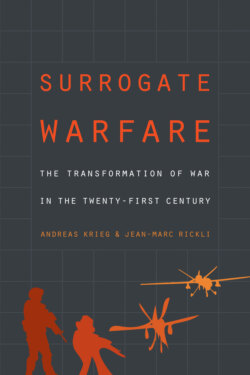Читать книгу Surrogate Warfare - Andreas Krieg - Страница 7
На сайте Литреса книга снята с продажи.
ACKNOWLEDGMENTS
ОглавлениеTHE IDEA FOR THIS BOOK DEVELOPED OVER THE PAST FOUR YEARS AMID OUR work with militaries in Europe and the Middle East, witnessing the extent to which warfare in the twenty-first century has increasingly become a multilateral exercise involving a range of actors of which some are patrons and others surrogates. We would like to express our thanks to the various military professionals with whom we have worked and whom we have consulted and educated in recent years. Their experience and personal input into this research project was of great importance to the formulation of a conceptual argument deeply rooted in empirical evidence. Further, our gratitude goes to the reviewers whose comments and recommendations have helped sharpen the focus of this book. Finally, we would like to acknowledge the journal Defence Studies for publishing our article on surrogate warfare in early 2018, on which we have received invaluable feedback and comments from readers that have helped us refine some of the ideas and concepts in this book (“Surrogate Warfare: The Art of War for the 21st Century?,” Defence Studies Journal 18, no. 2).
Andreas would like to thank the students at the Joaan Bin Jassim Joint Command and Staff College in Qatar and the UK Defence Academy for their constant availability to bounce ideas and refine the argument. In particular he would like to express special gratitude to the staff of the Development, Concepts and Doctrine Centre at the UK Defence Academy and the Oxford Research Group’s Remote Warfare Programme, whose roundtable meetings and discussion and focus groups have been instrumental in widening his horizon on all matters relating to warfare by delegation. The exchange with like-minded experts has clearly shown that there is a gap in the academic literature on what has become a quite prevalent mode of warfare in the twenty-first century that goes far beyond proxy warfare. Last but not least, Andreas would like to thank his family for their constant and unconditional support in all his endeavors. Above all, he would like to say thank you to his wife, Zohal, whose warm support, patience, and inspiration in times of writer’s block has helped him to stay sane and focused.
Jean-Marc would like to thank his students at Khalifa University in Abu Dhabi and at the Joaan Bin Jassim Joint Command and Staff College in Qatar as well as the participants of courses on disruptive technologies and warfare at the Geneva Centre for Security Policy (GCSP), who have always been a receptive and critical audience to the various ideas and arguments put forward in this book. Jean-Marc is also grateful to the Department of Defence Studies of King’s College London and the GCSP for having provided the best research conditions conducive to the publication of this book, be they in terms of thoughtful exchanges with colleagues or time and freedom to conduct research. Jean-Marc would like to dedicate this book to his dad, Jean Rickli (1943–2017), and to Alyson J. K. Bailes (1949–2016), who was an intellectual mentor who showed how academic research can be applied to concrete policy and strategic problems. Finally, he would like to thank dearly his family, Emmanuelle and Alexys, for their constant support, patience, and understanding for the long time spent abroad to conduct research.
